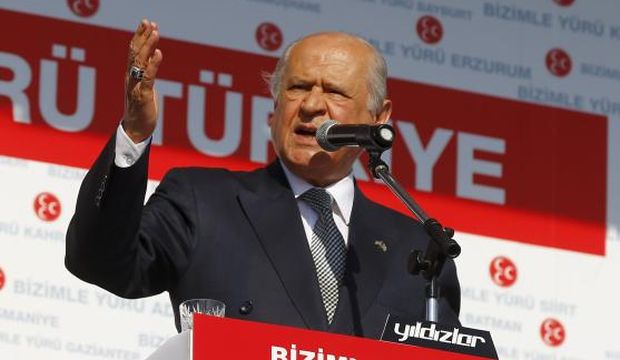
Nationalist Movement Party (MHP) leader Devlet Bahçeli addresses his supporters during an election rally for Turkey’s June 7 parliamentary election, in Istanbul, Turkey, on May 31, 2015. (Reuters/Osman Orsal)
Istanbul, Asharq Al-Awsat—The head of Turkey’s second-largest opposition party will agree to form a coalition with the Justice and Development Party (AKP) if President Recep Tayyip Erdoğan agrees to reopen a graft probe in which his son is implicated.
Devlet Bahçeli, the head of the Nationalist Movement Party (MHP), which came third in the June 7 general elections winning 16.3 percent of the vote, recently told members of his party the MHP “could not overlook” a December 2013 probe into corruption and bribing by AKP officials, which included Bilal Erdoğan.
According to Turkish daily Hürriyet, Bahçeli told his party he would ask Erdoğan to “give us Bilal and take the government.”
Leaked recordings—still unauthenticated—surfaced on Twitter in 2013, on which Erdoğan allegedly tells his son to use money stored in the family home to bribe officials. The leaks resulted in Erdoğan petitioning Turkey’s highest court to ban the use of the microblogging website in the country.
No clear winner emerged in the June 7 elections, with the AKP—which Erdoğan led for 13 years before becoming president in 2014—taking 40.9 percent of the vote—short of the 60-percent majority needed to govern.
Although as president Erdoğan officially no longer leads the AKP, he has reportedly chaired cabinet meetings and attended AKP election rallies. Opposition parties in Turkey warned voters before the polls that Erdoğan was seeking to turn Turkey’s presidency from a ceremonial post into an executive one, consolidating his grip on power once the AKP won another majority in the elections.
Since the results, opposition parties have turned up the heat on Erdoğan, demanding he leave the lavish Ak Saray presidential palace on the outskirts of Ankara and return to the former presidential seat—the more modest Çankaya presidential palace in the center of the city.
And in widely publicized comments, Kemal Kılıçdaroğlu, the leader of the second-placed Republican People’s Party (CHP), which won 25 percent of the vote, also recently said opposition parties should form the next government without the AKP—though it appears this move has now stalled due to the right-wing MHP refusing to form a coalition with the pro-Kurdish left-wing People’s Democratic Party (HDP), which placed fourth in the polls with 13.1 percent of the vote.
This comes as Erdoğan recently launched a lawsuit against Tolga Tanış, Hürriyet’s Washington correspondent, whose recent book on US–Turkish relations between 2009–2014 examines some of the corruption charges leveled against then-prime minister Erdoğan.
Erdoğan’s lawyer has said some of the information in the book is tantamount to slander.
